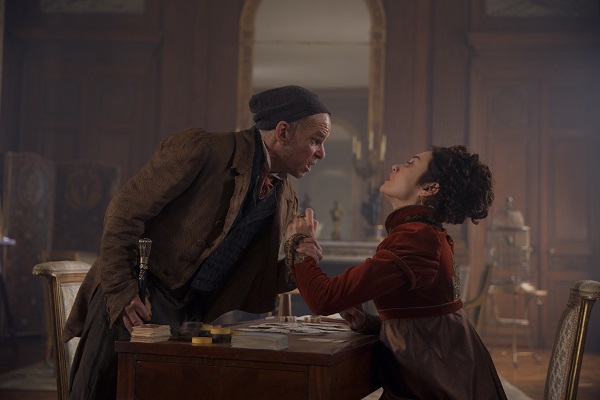The story of escape-artist and recidivist François Vidocq is said to have inspired Edgar Allan Poe and the first raft of detective novelists; if this doesn’t figure in the experience of watching The Emperor of Paris, it could be because the film and the historical record have barely a glancing regard for each other. Vidocq (Vincent Cassel) is introduced in 1805 in the midst of yet another ingenious escape from incarceration. Having made it back to Paris, and blending in untroubled as a fabric-seller, he’s brought back into the lattice-structured conflict between the state and the criminal underworld after meeting Annette (Freya Mavor), a fair-natured prostitute. The master criminal becomes a proto-detective, a police-informant, which sets him at odds with the cutthroats and mountebanks whose company he knows all too well.
In terms of form, Jean-François Richet’s film is, despite some strong sequences, plainly underwhelming. The images rarely fill the cinema screen; there’s a flatness inherent to the visuals, as well as a mostly convincing if not immersive production and costume design, meaning the The Emperor of Paris wouldn’t look out of place as a BBC One Sunday night period drama.
There’s the problem of the camera, too, which is off in another world from the one inhabited by the actors. Shot set-ups are almost hilariously over-elaborate, such as during a scene in which two investigators weigh up their situation, the camera prowls around the corners of a rectangular table — if you begin asking why this is the case it’s unlikely you’ll find the answer; and Manuel Dacosse’s cinematography has a propensity for canted angles which exaggerate the nature of the scenes in question.
That being said, the film is, generally, well-cast and well-acted. Generally, because Cassel himself, although performing the lead with a certain crafted, soft-spoken, mask-like blankness, is at times soporific, especially in a misconceived moment in which he berates the prisoners in whose capture he has had some hand. Mavor’s performance obtains a pathos another actor might not have found in something of a rote role (she is introduced in a shot which frames her looking into a bird cage, the bars seeming to encase her — and you wonder why that conceit hasn’t been retired yet). Denis Lavant, as the snarling, vicious gang-leader Maillard is clearly enjoying himself, and there’s fun to be had watching his face twist in revulsion, his elastic body charging through his scenes. August Diehl likewise is hamming it up for his turn as the upstart underworld orchestrator Nathanael, smiling as he kills.
But the best performances are found in slightly truncated roles. As social-climber and favour-trader Baroness Roxane of Giverny, Olga Kurylenko is given the space to complicate proceedings; her performance is noteworthy for its prop-work and her gestures: a seductive bout of fan-waving is utilised to exacting effect, and an early moment sees her try and ensorcel a member of France’s ruling class by the simple trick of tracing her index finger up and down her neck. She’s aware of the measure of comedy needed in these scenes, and plays it right. The other highlight is Denis Ménochet (familiar to viewers of 2017’s Custody) as the hulking, scowling policeman Dubillard. He has a brilliant face: in a confrontation with Vidocq, as he descends a staircase club in hand, his narrowing eyes and smirk convey more potently what’s about to happen than a threat could.
For all its missed opportunities, a couple of cases of narrative cutesiness, and a preposterous late-in-the-day cameo by a particular hat, The Emperor of Paris is undeniably entertaining — and you can thank its actors for that.
UK Premiere Screening at Vue Omni Centre Sat 22nd and Odeon Lothian Road Sat 29th Jun 2019.
On DVD and Digital from Mon 7 Oct 2019
